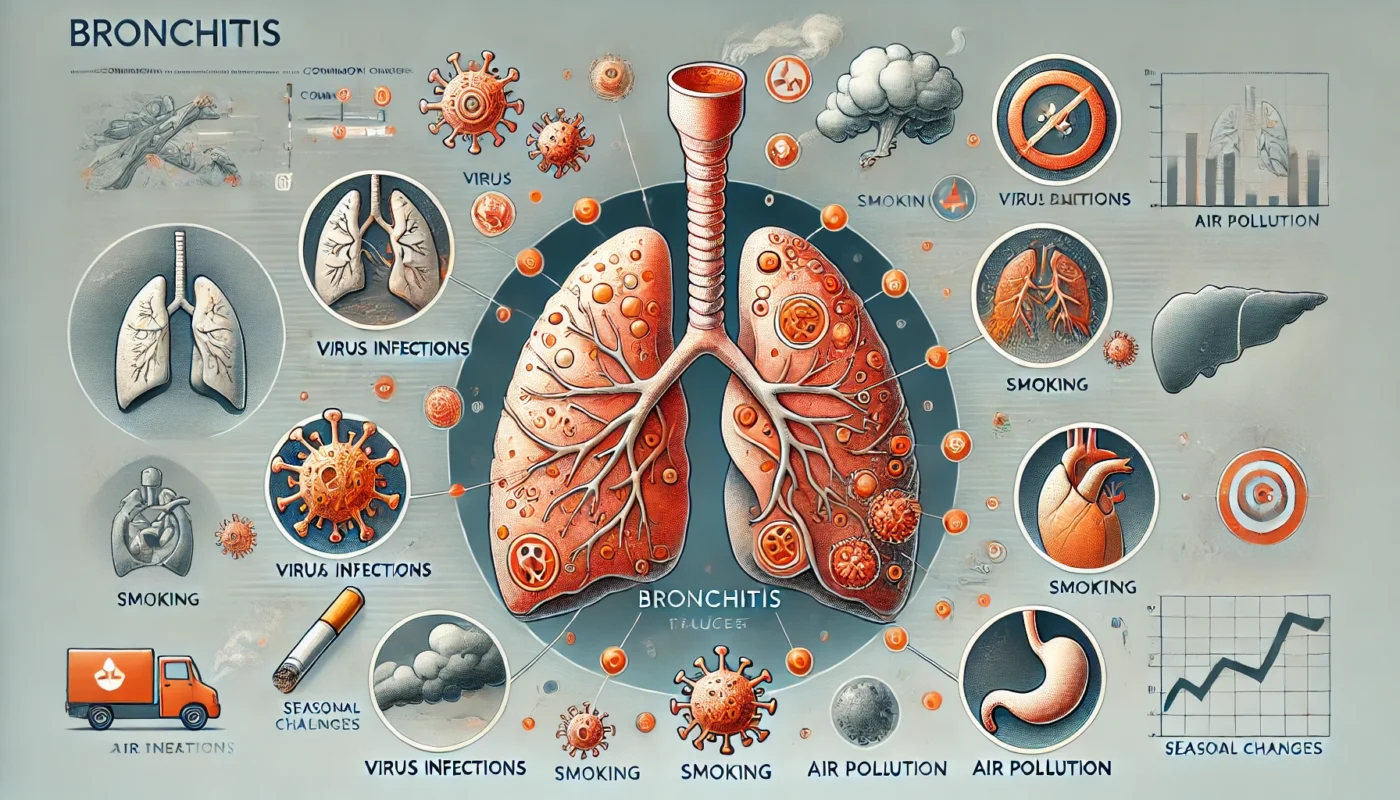Bronchitis is a common respiratory condition that affects millions of people worldwide each year. It occurs when the bronchial tubes, which carry air to and from the lungs, become inflamed. This inflammation can lead to discomfort, coughing, and difficulty breathing. This article delves into the description, symptoms, causes, treatment options, and prevention strategies for bronchitis, along with a discussion on the potential benefits of nutritional supplements for relief and recovery.
You May Also Like:
What is Bronchitis?
Bronchitis is a condition characterized by inflammation of the bronchial tubes. The condition can be classified into two main types:
- Acute Bronchitis: Typically caused by viral infections, acute bronchitis is short-term and often resolves within 10-14 days, though a lingering cough can persist.
- Chronic Bronchitis: A type of chronic obstructive pulmonary disease (COPD), chronic bronchitis involves long-term inflammation and mucus production, often caused by smoking or prolonged exposure to environmental irritants.
The Centers for Disease Control and Prevention (CDC) reports that acute bronchitis is one of the leading causes of outpatient visits, affecting approximately 5% of adults annually.

Symptoms of Bronchitis
The symptoms of bronchitis may vary depending on whether it is acute or chronic. Common symptoms include:
- Persistent Cough: Often produces mucus, which may be clear, white, yellowish, or green.
- Shortness of Breath: More common in chronic bronchitis.
- Wheezing: A whistling sound when breathing.
- Chest Discomfort: Tightness or soreness in the chest.
- Fatigue: Due to reduced oxygen intake and prolonged coughing.
- Low-Grade Fever and Chills: Common with viral infections in acute bronchitis.
Symptoms of acute bronchitis usually improve within a few weeks, while chronic bronchitis may persist and progressively worsen over time.
Causes of Bronchitis
1. Viral Infections
The most common cause of acute bronchitis is a viral infection, often the same viruses responsible for colds and flu. A 2015 study in The Journal of Clinical Virology found that respiratory viruses account for over 90% of acute bronchitis cases.
2. Bacterial Infections
Although rare, bacterial infections can also lead to bronchitis. These cases often require antibiotic treatment.
3. Smoking
Smoking damages the bronchial tubes and is a primary cause of chronic bronchitis. According to the American Lung Association, 85% of chronic bronchitis cases are linked to smoking.
4. Air Pollution and Environmental Irritants
Prolonged exposure to air pollution, dust, chemical fumes, and allergens can irritate the bronchial tubes and lead to chronic inflammation.
5. Weakened Immune System
Individuals with weakened immune systems, such as the elderly or those with chronic illnesses, are more susceptible to bronchitis.

Treatment Options for Bronchitis
1. Rest and Hydration
Adequate rest allows the body to recover, while staying hydrated helps thin mucus, making it easier to expel. Warm fluids, such as herbal teas and broths, can soothe the throat and alleviate symptoms.
2. Medications
- Bronchodilators: These help relax the muscles around the airways, improving airflow in cases of chronic bronchitis.
- Corticosteroids: Reduce inflammation in the airways and are often used for chronic bronchitis.
- Cough Suppressants: May provide relief for persistent coughs, though they should be used sparingly to avoid suppressing productive coughing.
3. Antibiotics
Antibiotics are not typically recommended for acute bronchitis unless a bacterial infection is confirmed. A clinical review in The Cochrane Database of Systematic Reviews (2017) concluded that antibiotics have limited effectiveness in treating viral bronchitis.
4. Steam Therapy
Inhalation of steam can help loosen mucus and relieve congestion. Adding essential oils like eucalyptus or peppermint may enhance the soothing effect.
5. Pulmonary Rehabilitation
For chronic bronchitis, pulmonary rehabilitation programs that include breathing exercises and physical activity can improve lung function and quality of life. A study in Chest (2018) found that pulmonary rehabilitation reduced hospitalizations for COPD patients by 37%.
Nutritional Supplementation for Bronchitis Relief
Nutritional supplements can support respiratory health, reduce inflammation, and boost the immune system, aiding in bronchitis recovery.
1. Bromelain
Bromelain, an enzyme derived from pineapples, is known for its anti-inflammatory properties. A study in The Journal of Medicinal Food (2016) found that bromelain supplementation reduced mucus production and eased respiratory symptoms in individuals with bronchial inflammation.
2. Vitamin C
Vitamin C strengthens the immune system and helps combat respiratory infections. Research in Nutrients (2017) highlighted that vitamin C supplementation reduced the duration and severity of respiratory symptoms in patients with acute bronchitis.
3. N-Acetylcysteine (NAC)
NAC is a precursor to glutathione, a powerful antioxidant. A 2015 study in The European Respiratory Journal found that NAC supplementation improved mucus clearance and reduced exacerbations in chronic bronchitis patients.
4. Magnesium
Magnesium plays a role in relaxing bronchial muscles and improving airflow. A randomized controlled trial in Magnesium Research (2014) reported that magnesium supplementation improved lung function in patients with respiratory conditions.
5. Quercetin
Quercetin, a flavonoid found in fruits and vegetables, has anti-inflammatory and antiviral properties. A study in Frontiers in Immunology (2019) found that quercetin supplementation reduced the replication of respiratory viruses, including those associated with bronchitis.

Steps for Possible Prevention of Bronchitis
While not all cases of bronchitis can be prevented, adopting certain strategies can significantly reduce the risk:
1. Quit Smoking
Smoking is the leading cause of chronic bronchitis. Quitting smoking not only reduces the risk of bronchitis but also improves overall respiratory health.
2. Practice Good Hygiene
Wash hands regularly and avoid close contact with individuals who have respiratory infections to minimize the risk of viral bronchitis.
3. Get Vaccinated
Vaccines for influenza and pneumococcal infections can reduce the risk of respiratory illnesses that may lead to bronchitis.
4. Avoid Environmental Irritants
Limit exposure to air pollution, dust, and chemical fumes by using masks or air purifiers in polluted environments.
5. Strengthen the Immune System
Maintain a balanced diet rich in fruits, vegetables, and whole grains, and consider supplements like vitamin C and zinc to boost immunity.
Conclusion
Bronchitis, whether acute or chronic, can significantly impact daily life. While acute bronchitis typically resolves within weeks, chronic bronchitis requires ongoing management to prevent complications. A combination of rest, hydration, medications, and pulmonary rehabilitation can aid recovery and improve quality of life. Nutritional supplements such as bromelain, vitamin C, NAC, magnesium, and quercetin offer additional support by reducing inflammation, boosting immunity, and enhancing respiratory health. Preventive measures, including quitting smoking, practicing good hygiene, and avoiding environmental irritants, are key to reducing the risk of bronchitis. With the right approach, individuals can effectively manage bronchitis and maintain long-term respiratory health.

References
- Bromelain’s penetration into the blood and sinonasal mucosa in patients with chronic rhinosinusitis. Retrieved from: https://pmc.ncbi.nlm.nih.gov/articles/PMC6036946/
- The effects of vitamins C and B12 on human nasal ciliary beat frequency. Retrieved from: https://pmc.ncbi.nlm.nih.gov/articles/PMC3663725/
- Effect of N- Acetylcysteine on Nasal Mucociliary Clearance in Chronic Sinusitis. Retrieved from: https://www.researchgate.net/publication/301797059_Effect_of_N-_Acetylcysteine_on_Nasal_Mucociliary_Clearance_in_Chronic_Sinusitis
- Quercetin attenuates naso-sinusal inflammation and inflammatory response in lungs and brain on an experimental model of acute rhinosinusitis in rats. Retrieved from: https://pubmed.ncbi.nlm.nih.gov/33214336/
Important Note: The information contained in this article is for general informational purposes only, and should not be construed as health or medical advice, nor is it intended to diagnose, prevent, treat, or cure any disease or health condition. Before embarking on any diet, fitness regimen, or program of nutritional supplementation, it is advisable to consult your healthcare professional in order to determine its safety and probable efficacy in terms of your individual state of health.
Regarding Nutritional Supplements Or Other Non-Prescription Health Products: If any nutritional supplements or other non-prescription health products are mentioned in the foregoing article, any claims or statements made about them have not been evaluated by the U.S. Food and Drug Administration, and such nutritional supplements or other health products are not intended to diagnose, treat, cure, or prevent any disease.

